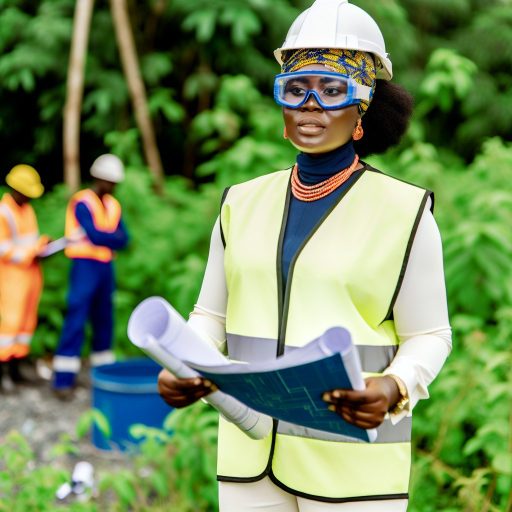Introduction:
Nigeria, like many other countries, faces significant challenges in environmental management.
With a growing population and increasing industrialization, the country must address key issues such as waste management, deforestation, and pollution.
Climate change poses a major threat to Nigeria’s economy, health, and overall well-being.
Addressing climate change is crucial to ensuring sustainable development and reducing the risk of extreme weather events.
Current Environmental Concerns in Nigeria
Nigeria’s current state of the environment is a cause for concern.
The country is grappling with various environmental issues.
These issues are having a negative impact on its natural resources.
They also affect wildlife and the overall well-being of its citizens.
Key Environmental Issues in Nigeria
- Deforestation has resulted in the loss of a significant portion of forest cover.
- Pollution is rampant from industrial activities and urbanization.
- Oil spills frequently occur in the Niger Delta region.
- Water scarcity affects many areas due to population growth.
Impact of Climate Change on the Environment
Climate change is exacerbating environmental issues in Nigeria.
The country is experiencing erratic weather patterns and extreme temperatures.
Unpredictable rainfall is impacting ecosystems and communities.
- Agriculture is being affected, leading to crop failures and reduced food security.
- Many plant and animal species are pushed to the brink of extinction.
- Climate change is contributing to the spread of diseases.
- Population displacement and conflicts are escalating.
Urgent attention is needed for environmental management in Nigeria.
Effective strategies can address current challenges and climate impacts.
Collaboration among government, NGOs, and citizens is essential.
Implementing sustainable practices and promoting renewables is vital.
Conserving natural resources will help ensure a healthier future.
Government efforts in environmental management:
– Policies and regulations in place to protect the environment
– Initiatives to address climate change at the national level
Policies and Regulations:
The Nigerian government has put in place various policies and regulations aimed at protecting the environment.
These policies are designed to ensure sustainable development and to mitigate the negative impact of human activities on the environment.
One of the key policies in this regard is the National Environmental Policy, which provides a framework for addressing environmental issues in the country.
This policy outlines the government’s commitment to sustainable development and sets out various strategies for managing environmental resources effectively.
In addition to the National Environmental Policy, Nigeria has also implemented the Environmental Impact Assessment (EIA) Act.
This act requires that any proposed development project undergo an assessment to determine its potential impact on the environment.
Through the EIA process, the government aims to identify potential risks and ensure that appropriate mitigation measures are put in place to safeguard the environment.
Initiatives to Address Climate Change:
Climate change is a pressing issue that poses a significant threat to Nigeria’s environment and economy.
In response, the government has initiated various strategies to address climate change at the national level.
One of the key initiatives in this regard is the development of the National Climate Change Policy.
This policy outlines Nigeria’s commitment to reducing greenhouse gas emissions and adapting to the impacts of climate change.
Furthermore, Nigeria is a signatory to the Paris Agreement, an international treaty aimed at combating climate change.
By being part of this agreement, Nigeria has committed to reducing its greenhouse gas emissions and transitioning to a low-carbon economy.
The government is working towards implementing measures to achieve its climate goals, including investing in renewable energy and promoting sustainable practices.
The Nigerian government has made significant efforts in environmental management and addressing climate change.
Through the implementation of policies and initiatives, Nigeria is working towards a more sustainable future for its environment and its people.
Uncover the Details: Role of Women in Environmental Management Nigeria
Challenges facing environmental management in Nigeria:
- Lack of enforcement of environmental laws
- Limited resources for environmental protection
- Conflicts between economic development and environmental conservation
Lack of enforcement of environmental laws
Nigeria faces significant challenges in enforcing environmental laws and regulations.
The lack of strict enforcement mechanisms allows companies and individuals to flout environmental standards with impunity.
This results in widespread pollution and destruction of natural resources.
Limited resources for environmental protection
Another major challenge is the limited financial resources allocated to environmental protection efforts in Nigeria.
Insufficient funding hampers the implementation of sustainable and effective environmental management initiatives.
Transform Your Career with Expert Guidance
Get personalized mentorship consulting that’s tailored to your unique path. Our expert advice is actionable and exclusive.
Get StartedThis lack of resources poses a significant barrier to addressing environmental issues in the country.
Conflicts between economic development and environmental conservation
Nigeria struggles with balancing economic development initiatives with the need for environmental conservation.
The pressure to drive economic growth often leads to unsustainable practices that harm the environment.
This conflict highlights the need for integrated planning and decision-making processes that prioritize both economic progress and environmental protection.
Addressing the challenges facing environmental management in Nigeria requires a multi-faceted approach.
This includes strengthening enforcement mechanisms, increasing funding for environmental protection, and promoting sustainable development practices.
By tackling these issues head-on, Nigeria can work towards a more sustainable future for its environment and its people.
Explore Further: Role of NGOs in Nigeria’s Environmental Management Efforts
Role of the private sector in environmental management:
- Corporate social responsibility initiatives
- Collaboration with government and NGOs to address environmental issues
Corporate Social Responsibility Initiatives:
The private sector in Nigeria plays a crucial role in environmental management through their corporate social responsibility (CSR) initiatives.
These initiatives focus on various aspects of sustainability, including environmental protection, community development, and ethical business practices.
Companies engage in CSR activities such as tree planting campaigns, waste management programs, and renewable energy projects to minimize their environmental impact.
By investing in sustainable practices, businesses can reduce their carbon footprint and contribute to the overall conservation of the environment.
Furthermore, CSR initiatives can enhance the reputation of companies, attract environmentally-conscious consumers, and improve employee morale.
By actively participating in environmental management efforts, businesses can establish themselves as responsible corporate citizens committed to sustainable development.
Collaboration with Government and NGOs:
In Nigeria, the private sector collaborates closely with government agencies and non-governmental organizations (NGOs) to address environmental issues effectively.
These partnerships leverage the resources, expertise, and networks of different stakeholders to implement sustainable solutions.
Through joint initiatives, businesses, government, and NGOs work together to develop policies, regulations, and programs for environmental protection and conservation.
This collective approach ensures that diverse perspectives are considered, and strategies are implemented to mitigate environmental challenges.
Private sector organizations often provide funding, technical support, and innovative solutions to environmental projects undertaken by government and NGOs.
By sharing knowledge and resources, stakeholders can achieve greater impact and create a more sustainable future for Nigeria.
Uncover the Details: Environmental Impact Assessment: How This Discipline Protects Nigeria’s Ecosystems

Community involvement in climate change adaptation:
Importance of local participation in environmental conservation efforts
Community involvement in climate change adaptation is crucial for effective environmental management and sustainable development.
Local participation in environmental conservation efforts helps in fostering a sense of ownership and responsibility among community members towards their natural resources.
When communities are actively engaged in climate change adaptation initiatives, they are more likely to adopt environmentally-friendly practices and promote sustainable living.
This not only benefits the environment but also improves the quality of life for community members.
Additionally, community involvement in environmental conservation efforts can lead to the creation of green jobs and opportunities for local businesses.
By actively participating in climate change adaptation projects, communities can boost their economies and promote sustainable development.
Examples of successful community-led initiatives in Nigeria
- The Ogoni Clean-Up Project: The Ogoni community in Nigeria has been actively involved in the clean-up and restoration of their environment, particularly the polluted Ogoni land.
- Community Reforestation Programs: Several communities in Nigeria have initiated reforestation projects to combat deforestation and mitigate the impacts of climate change.
- Waste Management Initiatives: Many communities in Nigeria have implemented waste management initiatives to reduce environmental pollution and promote recycling.
- Renewable Energy Projects: Some communities in Nigeria have embraced renewable energy technologies such as solar panels and biogas systems to reduce their reliance on fossil fuels and combat climate change.
- Climate Smart Agriculture Practices: Farmers in various communities across Nigeria have adopted climate-smart agricultural practices to enhance food security and resilience to climate change.
Overall, community involvement in climate change adaptation is essential for achieving environmental sustainability and resilience in Nigeria.
By actively engaging local communities in environmental conservation efforts, we can create a more sustainable future for generations to come.
Let’s continue to support and empower communities to take action against climate change and build a greener, more resilient Nigeria.
Delve into the Subject: Challenges in Implementing Environmental Policies in Nigeria
Key Points of Nigeria’s Environmental Challenges
Nigeria is facing significant environmental challenges due to climate change.
Deforestation, pollution, and poor waste management exacerbate these issues.
The government has initiated some policies, but more action is needed.
Call to Action for Environmental Protection
It is crucial for individuals to adopt sustainable practices in their daily lives.
Organizations should invest in eco-friendly technologies and practices.
Collaboration between stakeholders is essential for effective environmental management.
Everyone must take responsibility and work towards a greener and healthier Nigeria.
Additional Resources
Systematic review of climate change impact research in Nigeria …
Climate Change, Conflict, and Resource Extraction: Analyses of …




